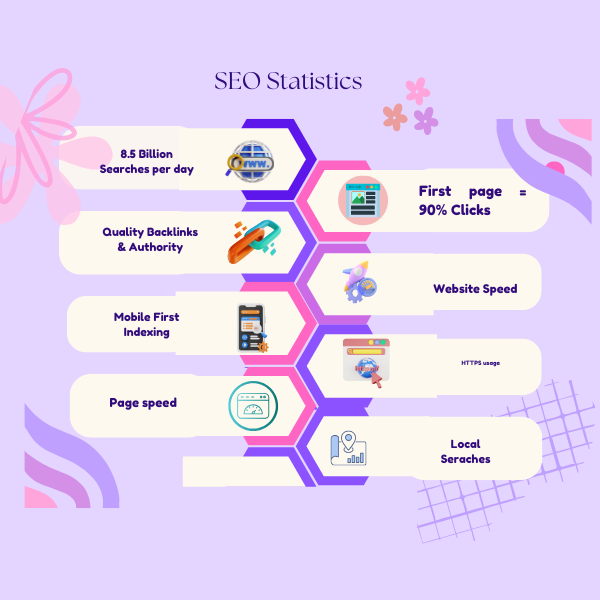Selecting the right domain name for your website is one of the most crucial decisions you’ll make, especially when it comes to SEO (Search Engine Optimization). Your domain name not only shapes your brand’s identity but also plays a pivotal role in your website’s search engine rankings. In this post, we’ll explore the best practices for choosing an SEO-friendly domain name, making sure it’s optimized for visibility and impact.
Table of Contents
Why a Domain Name Matters for SEO?
Before we delve into the specifics, let’s address why a domain name is so important for SEO. Your domain name is essentially the digital address of your website. It’s the first thing people notice and the first thing search engines crawl. A poorly chosen domain can make your website harder to find and reduce its chances of ranking well on search engines like Google.
The goal is to pick a domain name that resonates with users, is easy to remember, and aligns with SEO principles to ensure it contributes positively to your site’s overall ranking.
Characteristics of an SEO-Friendly Domain Name
Here are some critical characteristics of a domain name that can help boost your site’s SEO:
a. Relevance and Brand Identity
Your domain should reflect what your site is about, either through a branded name or by incorporating relevant keywords. If you’re launching a blog about travel tips, for instance, a domain like “TravelingAdventures.com” would work better than something generic like “MyBlog123.com.” The idea is to make your domain name easy for users (and search engines) to understand what your site offers.
b. Short and Memorable
Shorter domain names tend to perform better in SEO because they are easier to remember and less prone to mistyping. Keep it concise, ideally between 6 to 14 characters. Long domain names are difficult to remember, and users might misspell them, leading to lost traffic.
c. Easy to Spell and Pronounce
An often overlooked factor is how easy it is to spell and pronounce a domain name. This matters because when people hear your domain in a conversation or see it on a sign, they need to be able to remember and type it without mistakes.
d. Avoid Hyphens and Numbers
Hyphens and numbers are typically confusing to users. A domain like “best-travel-site.com” is less desirable than “besttravelsite.com” because people often forget the hyphen when typing. Similarly, using numbers can be tricky as people might not know whether to type the numeral (3) or the word (three).
The Role of Keywords in Domain Names
One of the most debated topics when choosing a domain is whether or not to include keywords. Here’s a breakdown of how keywords in domains impact SEO:
a. Importance of Keywords
In the past, it was common practice to include keywords in your domain name for SEO purposes. Domains like “bestusedcars.com” would easily rank for the keyword “best used cars.” While it’s still beneficial to include keywords, search engines now place more value on overall content and user experience.
b. Branded Domains vs. Exact Match Domains (EMD)
Exact Match Domains (EMDs) are domain names that exactly match a search query, like “BuyShoesOnline.com.” Google once rewarded EMDs with high rankings, but this is no longer the case. Today, branded domains that may or may not contain keywords, such as “Nike.com” or “Airbnb.com,” have gained more prominence.
Therefore, if you can naturally fit a relevant keyword into your domain without sacrificing branding, go for it. But don’t force it. A memorable, brandable domain is more beneficial in the long run.
Domain Extensions and Their Impact on SEO
The domain extension (also known as TLD – Top-Level Domain) you choose can also influence your SEO. Here’s how different extensions impact rankings:
a. Common TLDs (.com, .net, .org)
The .com extension is still the most trusted and preferred TLD for most users. When people think of a website, they usually assume it ends in .com. This popularity also makes it slightly more favorable in terms of SEO because of the trust factor. While .net and .org are also commonly used, they don’t carry the same instant recognition and trust as .com.
b. Newer TLDs (.blog, .shop, .co, etc.)
In recent years, several new domain extensions like .blog, .tech, .shop, and .co have been introduced. While these can be useful for branding purposes, they may not carry the same authority as the traditional extensions. However, Google has stated that TLDs don’t directly impact search rankings, meaning it’s more about user trust than SEO algorithms.
c. Geographic TLDs (.us, .uk, .ca, etc.)
Geographically specific TLDs can be beneficial if your website targets a particular country. If you’re launching a business that caters primarily to UK customers, using .uk can signal relevance to users and search engines alike.
Domain Age and SEO
While domain age isn’t a huge factor in SEO, it can still play a small role in search rankings. Older domains that have been consistently providing value over the years tend to rank better, but a newer domain can still compete if the content and SEO strategies are strong. Domain history is more important than the exact age, so if you’re purchasing a pre-owned domain, ensure that it hasn’t been penalized in the past.
How to Future-Proof Your Domain Name?
As your business grows, so too might your website. It’s essential to choose a domain name that will still be relevant if you decide to expand your offerings.
a. Think Long-Term
Don’t choose a domain name that limits your business to one product or service. For instance, if you’re selling shoes but plan to expand into other fashion products, a domain like “bestshoesstore.com” will limit your future growth. Opt for something more flexible, like “bestfashionstore.com.”
b. Trademark Considerations
Check if the domain name you’re interested in is already trademarked by another company. You don’t want to face legal issues down the road because your domain conflicts with an existing trademark.
c. Social Media Consistency
Ensure that the name you choose is available across social media platforms. Consistency in branding across your domain and social channels is crucial for building trust and recognition.
Best Practices for Choosing an SEO-Friendly Domain
Here are some final tips to guide you in selecting a domain name that’s both user-friendly and optimized for SEO:
- Research Competitors: Look at the domain names of your competitors and analyze what works and what doesn’t.
- Test for Usability: Get feedback from others to see if your domain name is easy to spell, remember, and pronounce.
- Use Domain Name Generators: If you’re struggling to come up with ideas, domain name generators like LeanDomainSearch or NameMesh can offer inspiration based on your preferred keywords.
Conclusion
Choosing an SEO-friendly domain name is about balancing branding with functionality. It needs to resonate with your audience, be memorable, and align with SEO best practices. While keywords in domain names still hold some relevance, search engines prioritize overall user experience and content quality. Additionally, factors like domain extension and age can influence SEO, but they are secondary to more critical elements like relevancy and usability.
Ultimately, the best domain names are those that stand the test of time, evolve with your business, and offer a positive experience to both users and search engines. Take your time in choosing the right one—it will serve as the cornerstone of your website’s online presence for years to come.
Contact us for your SEO Needs.




